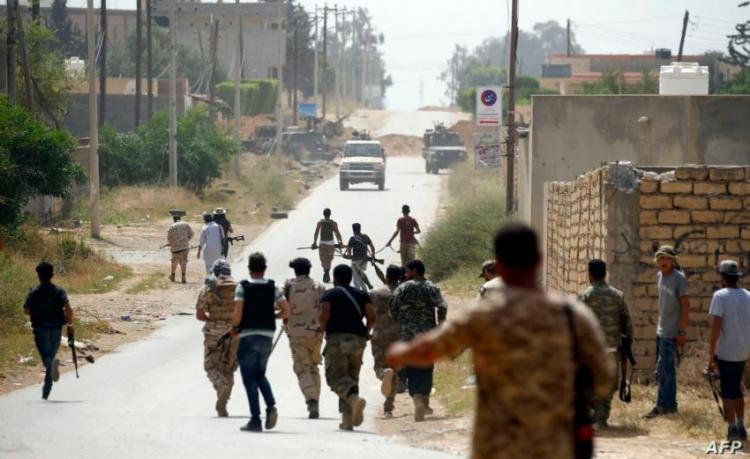Efforts towards political track in Libya and Turkish obstruction
Cairo – North-Press Agency
Muhammad Abu Zaid
Voices rose inside and outside Libya for a ceasefire and turning towards a political track, while analysts consider the Turkish role an impediment to any political track due to Ankara's limitless ambitions in Libya.
Military operations inside Libya have not subsided in the past few days. After the strategic withdrawal of the Libyan National Army (LNA) from some key areas, and with the Government of National Accord (GNA) taking over the strategic al-Watiya Air Base, developments followed by various operations in a number of axes against Ankara-backed militias resulted in the capture of a number of militants and the killing and injury of others.
On Saturday, a group of Libyan officials issued a statement calling for a return to the political track, in light of the continuing reality of rupture and fragmentation in the country. The fight destroys lives and property every day and increases the number of displaced people, bringing it to hundreds of thousands of people who are in great human suffering, in addition to the dangers of the severity of the external interference that has become apparent to the public.
The statement issued by the Council called for "a ceasefire, disengagement, taking all necessary technical measures, and commitment to return to the Geneva dialogue to agree on a truce as a first stage in preparation for a final agreement for cessation of hostilities, establishing civil peace and establishing stability via the urgent return to dialogue within the political track to form a new executive authority. This authority will be built on the structure of a presidential council composed of a president, two deputies, a prime minister of a unity government, and naming those holding sovereign positions under a Libyan consensus.
International conflict
Libyan politician Mohamed al-Abani, president of the Libyan General National Congress, sees that the whole scene has turned into something resembling an international conflict in Libya. In the face of this scene, attempts to push the political process are no longer possible as the conflict worsens and parties insist on their position, plunging Libya deeper and deeper into the swamp.
This complex situation, according to al-Abani's statements to North-Press, cannot bring the two parties to the negotiating table, because of the exacerbation of the conflict and its ramifications and their determination to continue the military track. This is especially true in light of foreign interventions that have greatly disrupted the process in Libya, especially with the entry of Syrian mercenaries fighting Libyans. Thus the solution within Libya is the emergence of a third party in the conflict that may be able to finally resolve things and turn the situation around.
However, Munir Adib, an expert on Islamic movements and international terrorism, believes that a viable solution to what Libya is witnessing now in light of Turkey's use of mercenaries to support the militia government will only be through the movement of allies who support the Libyan National Army to stop the Turkish march, and prevent the division of Libya in favor of Turkish influence.
Ali al-Takbali, a member of the Defense and National Security Committee of the Libyan House of Representatives, said in recent media statements that the number of Turkish advisers pushed by Ankara to Libya reached 1,500, with more than 10,000 Syrian fighters brought by Turkey to fight with militias. "Turkey wants to occupy Libya and impose Turkish hegemony," he said.
Political solution
On the other hand, Libyan politician Ibrahim Belkasim believes that things are moving towards a political solution, based on strong international efforts in that context. In his statements to North-Press he refers to recent American contacts, and other international powers such as Russia working hard to push for a political settlement, as well as the European Union and the Italian role in particular.
Belkasim ruled out what is raised about Turkey's exploitation of the situation to find a permanent military base in Libya, indicating that Turkey has no popular base in Libya at all.
He explained that the next few days may witness agreements on the exit of foreign fighters from Libya, and then the start of the political process. He said that there is no clearer and more public track than the political track announced by the Speaker of the House of Representatives, Counselor Aqila Saleh.
Regarding the current escalation in Tripoli and the ongoing operations there, Belkasim stressed that the area south of Tripoli is practically considered a de-escalation zone despite the operations that it is currently witnessing, given that the operations taking place now constitute only 10% of the volume of fighting that was witnessed about two and a half months ago.
Observers say Turkey stands in the way of peace efforts in Libya by supporting militias fighting in Tripoli against the LNA, led by Field Marshal Khalifa Haftar, fuelling the armed conflict that has turned Libya into an arena of international conflict in the footsteps of the Syrian war, that is failing the efforts to push the political track toward resolving the crisis that is affecting all Libyans.

